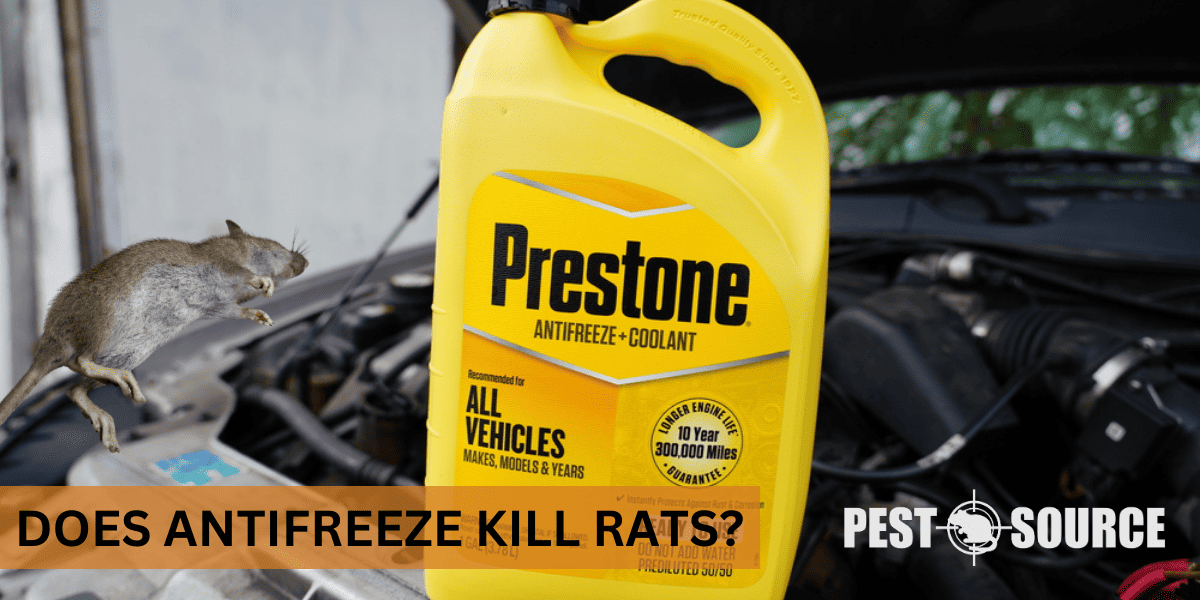Antifreeze, containing ethylene glycol, is highly toxic and can indeed be lethal to rats if ingested. This post will discuss the mechanism of how antifreeze affects rats and the ethical and safety concerns surrounding its use as a pest control method. It’s crucial to consider the environmental impact and potential hazards to other wildlife and pets when using antifreeze for rodent control.
POINTS
- Antifreeze, containing ethylene glycol, is toxic to rats and can lead to kidney failure and death, but it is not a recommended method for rodent control due to inhumane and indiscriminate effects.
- The sweet taste of antifreeze can attract rats and mice, posing a significant risk of ingestion and subsequent poisoning.
- Death from antifreeze is painful and prolonged, raising serious ethical concerns regarding its use as a rodenticide.
- The use of antifreeze poses a danger not only to rodents but also to non-target wildlife, pets, and humans, with the potential for accidental poisoning.
- Safer and more humane alternatives for rodent control, such as snap traps or electric traps, should be used instead of antifreeze, which is both inhumane and hazardous to the environment.
Efficacy of Antifreeze as a Rodenticide
Antifreeze, a common automotive coolant, is known for its toxic properties, particularly to pets and wildlife. Its main ingredient, ethylene glycol, is a potent chemical that can also affect rodents such as rats and mice. In this article, we’ll delve into the chemical properties of antifreeze and evaluate its efficacy as a rodenticide.
Chemical Properties of Antifreeze and Toxicity to Rats
Ethylene glycol, the primary component of antifreeze, is highly toxic to rats due to its ability to disrupt biological processes. When ingested, it metabolizes into toxic compounds that can cause severe kidney damage, leading to renal failure and death.
Does Antifreeze Kill Rats?
Yes, antifreeze can kill rats. Its sweet taste can attract rodents, but once consumed, the toxic effects are swift and often fatal.
Can Antifreeze Kill Rats Effectively?
While antifreeze does have the capability to kill rats, it is not a recommended method for rodent control due to its inhumane nature and the potential risk to other non-target animals and humans.
How Fast Does Antifreeze Kill Rats?
The timeline for antifreeze to affect rats can vary. Symptoms of poisoning can appear within 30 minutes to several hours after ingestion, with death potentially occurring within 24 to 72 hours.
How Long Does It Take for Antifreeze to Kill Rats?
The exact time it takes for antifreeze to kill rats depends on the amount ingested and the size of the rat. Generally, it could take a few hours to a couple of days for the rodent to succumb to the poisoning.
Impact of Antifreeze on Rats and Mice
Antifreeze affects both rats and mice similarly due to their comparable physiology.
Will Antifreeze Kill Mice?
Yes, antifreeze will also kill mice. Like rats, mice are susceptible to the toxic effects of ethylene glycol.
How Does Antifreeze Kill Mice?
Antifreeze kills mice in the same way it does rats—through the ingestion of ethylene glycol, which metabolizes into toxic byproducts, leading to kidney failure and death.
Behavioral Patterns: Will Rats and Mice Consume Antifreeze?
Rats and mice have a keen sense of taste and are attracted to sweet flavors, which unfortunately includes the taste of antifreeze.
Will Rats Drink Antifreeze?
Rats may drink antifreeze if they come across it, as the sweet taste can be appealing to them.
Will Mice Drink Antifreeze?
Similarly, mice may also consume antifreeze due to its sweetness, which masks the lethal effects of the chemical.
Does Antifreeze Still Taste Sweet?
Many formulations of antifreeze still have a sweet taste, although there have been efforts to add bittering agents to deter ingestion by animals and children.
What Does Antifreeze Taste Like?
Antifreeze typically has a sweet taste, which can make it dangerously attractive to animals, including rodents.
Mechanism of Toxicity and Physiological Effects on Rodents
Understanding how antifreeze poisoning occurs in rodents provides insight into the severity of its effects.
How Antifreeze Affects Rodent Physiology
Upon ingestion, antifreeze’s active ingredient, ethylene glycol, is metabolized in the liver into toxic compounds that cause acidosis, central nervous system depression, and ultimately, kidney failure.
Timeline of Toxicity
How Long Does It Take a Rat to Die from Antifreeze?
The time it takes for a rat to die after consuming antifreeze can vary, but symptoms can develop rapidly, and death can occur within a day or two after ingestion.
How Much Antifreeze Will Kill a Rat?
A small amount of antifreeze can be lethal to rats. As little as a teaspoon can be enough to cause fatal kidney damage.
Ethical Considerations and Pain Involved
The use of antifreeze as a rodenticide raises significant ethical concerns due to the painful and prolonged suffering it causes to the animal.
Is Antifreeze Death Painful?
Death from antifreeze is considered to be a painful and inhumane method of pest control. The suffering caused by the toxic effects can last for hours or days.
Antifreeze as Rat Poison: Ethical Implications
Using antifreeze as a means to kill rats is not only unethical but also illegal in many areas due to the cruel nature of the death and the risks posed to other wildlife, pets, and humans.



